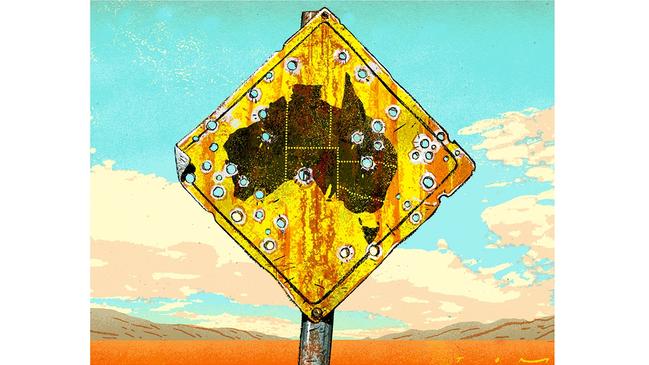Our parochial states are a sign of another time

Border towns separated by a line surveyed more than a century and a half ago is ludicrous beyond sporting rivalry.
This is something I hear constantly from people on the street, from businesses to service providers. They are over-regulated with three tiers of government and the resulting duplication of costs.
States have become the realm of capital cities more than the guardians of the corners of their lands. There is a good argument that capital cities be a “state” in their own right; alone, by the removal of the cities’ multiple local government areas.
The talents that undoubtably reside at a state government level would be better applied at a larger regional government level or a national level.
North Queenslanders in 2020 dislike the “state” of Brisbane that rules them. It is cumbersome, chaotic and largely irrelevant. New England feels no great affection in being governed from Sydney, with its Sydney-inspired regulations.
In 2020, with a population of about 26 million and in an era of quantum computing, our federation, stitched together in 1901, is no longer a good fit. Opinions and priorities are changing.
Edicts covering the COVID-19 crisis have shown that proximity to regulations brings a better understanding of how they are applied. Stanthorpe has a better idea of what is needed for Urbenville, just across the border in NSW, than Brisbane or Sydney does.
In a previous time there were no cars, no sealed roads, houses had outside toilets and the nightman, in a cart pulled by a horse, came to deal with them. The world view was very different to now. When there was no electricity, but maybe gas kitchens, where many country houses had a wood stove that was away from the house so the house didn’t burn down, and families did not have holidays at motels up the coast because there were no airports, no planes and no motels, then maybe attachment to a state was stronger.
It’s not where we live today.In the past, many people never visited another state.
Now it is absolutely standard fare for people in everyday jobs to cross state borders. They are merely commas in the conversation, or rather they should be, and if medical requirements should demand a full stop, then that should be governed by a regional epidemiology that ignores arbitrary state borders.
To the northeast of New England, the federal seat of Wright goes right into the suburbs of Brisbane. This shows how ridiculous it is that legislation in the northern part of my electorate overwhelmingly comes from Sydney. The very north of New England doesn’t even run on NSW time in summer. In southwest NSW, Adelaide is the closest city.
The US dealt with this problem by creating new states, and if we have a timeline from 1788 and the arrival of the First Fleet to today and overlapped it with the Mayflower’s arrival in the Americas to around 1860, we would see they had by then created more than 30 states. At least the regulations drawn down in these new states were local to them.
I introduced a bill in the federal parliament for regional senators to, at least partly, deal with this problem. This was a resolution unanimously passed by delegates from regional areas at our federal conference but it did not even succeed in being given time for debate. The political will to reduce government or upset the geographical gerrymander of the capital cities is just not there.
I know this idea will be unpopular with state governments. But a good operator will be a better operator if given a more streamlined government operation. If it is self-preservation, then plan for the change in the medium term after your political career is retired, and in the long term be seen as the statesman or woman who made the nation a better place.
The change has been happening — incrementally and clumsily perhaps — over the past 100 years, and there is no going back. Watch your political shows on television. How many interview state politicians? Go to your local chamber of commerce or even your Rotary meeting and ask for a show of hands as to who thinks states are relevant in 2020. You will get a shock. The relevance of states is informally waning and, although it may not die, it will sit at some stage in the next half a century as a pleasant old club in a historic old street. But without a proper plan and process, this slippage is the worst path forward.


The erratic parochialism of the arbitrary restrictions on state borders under the heading of coronavirus is yet another sign that states, in their present guise, are past their use-by date. Colonial reliquaries are in need of serious amendment or removal.